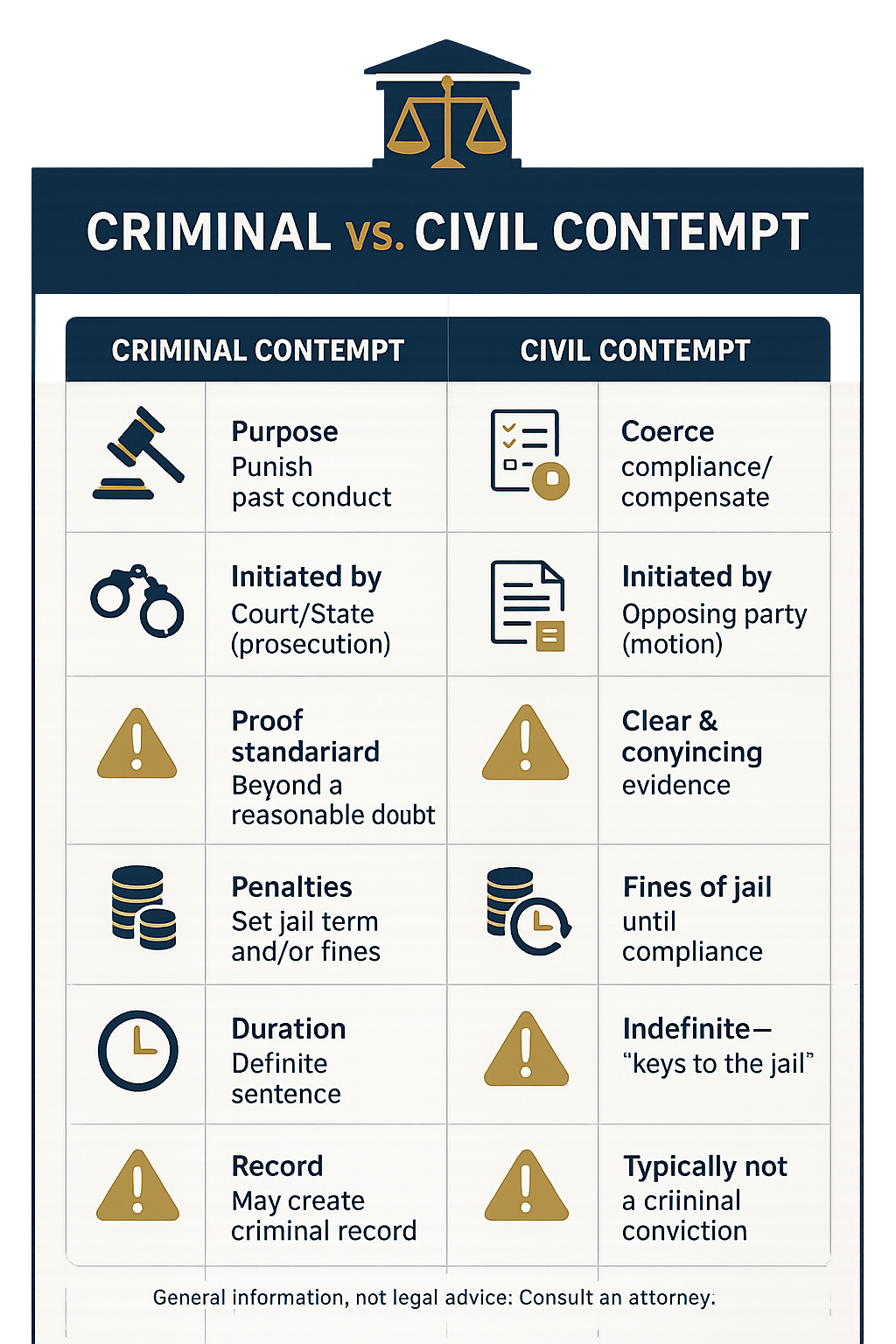Navigating the legal landscape can be complex, especially when it comes to understanding the nuances of contempt of court. Contempt can arise in both criminal and civil contexts, each carrying its own implications and consequences. This guide will explore the differences between Civil and Criminal Contempt, highlighting their legal ramifications and the processes involved.

What Is Contempt of Court?
Contempt of court refers to actions that disrespect the authority of the judiciary or obstruct the administration of justice. Courts have the power to hold individuals in contempt to uphold their orders and maintain order within the court. Contempt can be broadly classified into two categories: criminal and civil.
Understanding Criminal Contempt
Criminal contempt is an offense against the authority of the court itself. It typically involves actions that directly challenge or undermine the court’s ability to conduct its proceedings effectively.
Key Features of Criminal Contempt
- Nature of Offense: Criminal contempt is usually punitive, meaning that it is designed to punish the offender for their actions. This can include willful disobedience of a court order, disruptive behavior in court, or failure to comply with a subpoena.
- Legal Proceedings: Criminal contempt cases are handled similarly to criminal cases, where the prosecution must prove the defendant’s guilt beyond a reasonable doubt. The accused has the right to legal representation and can defend themselves against the charges.
- Potential Penalties: Penalties for criminal contempt may include fines, imprisonment, or both. The length of imprisonment can vary depending on the severity of the contemptuous behavior.
- Examples of Criminal Contempt: Common examples include:
- Disobeying a court order, such as failing to pay child support.
- Disrupting court proceedings by yelling or causing a disturbance.
- Refusing to comply with a subpoena to appear in court.
Understanding Civil Contempt
Civil contempt, on the other hand, is primarily designed to coerce compliance with a court order rather than punish the offender. It often arises in the context of family law or civil disputes.
Key Features of Civil Contempt
- Nature of Offense: Civil contempt focuses on ensuring compliance with court orders. It is remedial in nature, meaning the court seeks to compel the offending party to fulfill their obligations rather than punish them.
- Legal Proceedings: Civil contempt proceedings are typically less formal than criminal contempt cases. The party seeking contempt must demonstrate that the other party has failed to comply with a specific court order.
- Potential Penalties: Penalties for civil contempt often involve coercive measures, such as fines or imprisonment until the individual complies with the court order. The length of imprisonment is generally not fixed, as it lasts until compliance is achieved.
- Examples of Civil Contempt: Common examples include:
- Failing to pay court-ordered child support or alimony.
- Ignoring visitation orders in custody cases.
- Disobeying a restraining order.
Key Differences Between Criminal and Civil Contempt
While both criminal and civil contempt involve disobedience to court orders, they differ significantly in purpose, procedures, and consequences. Here’s a side-by-side comparison:
| Aspect | Criminal Contempt | Civil Contempt |
|---|---|---|
| Purpose | Punishment for disrespecting the court | Compelling compliance with court orders |
| Nature of Proceedings | Formal legal proceedings | Less formal, often initiated by a party |
| Standard of Proof | Beyond a reasonable doubt | Clear and convincing evidence |
| Penalties | Fines, imprisonment, or both | Fines or imprisonment until compliance |
| Legal Representation | Right to an attorney | Right to an attorney |
| Outcome | Punitive measures | Remedial measures |
Legal Consequences of Contempt
Understanding the legal consequences of contempt is essential for both individuals and attorneys. Here are the potential repercussions for committing criminal and civil contempt:
Criminal Contempt Consequences
- Fines: Individuals found guilty of criminal contempt may face hefty fines imposed by the court.
- Imprisonment: Depending on the severity of the contemptuous act, individuals may be sentenced to jail time. The duration of imprisonment can vary based on the offense.
- Criminal Record: A conviction for criminal contempt can result in a permanent criminal record, which may impact future employment opportunities and other aspects of life.
- Increased Sentencing: Repeat offenders can face increased penalties for subsequent contempt actions, including longer jail sentences and higher fines.
Civil Contempt Consequences
- Fines: Courts may impose fines on individuals who fail to comply with court orders. These fines can accumulate over time if compliance is not achieved.
- Coercive Imprisonment: Individuals may be held in jail until they comply with the court order. This can lead to indefinite imprisonment in some cases, as the court may not set a definitive release date until compliance is met.
- Modification of Orders: Courts may modify existing orders to ensure compliance, such as changing custody arrangements or increasing support obligations.
- Legal Fees: The party seeking civil contempt may be awarded attorney fees and costs incurred in pursuing the contempt action.
When to Seek Legal Help
If you believe you may be facing contempt charges or if you need to enforce a court order, it’s essential to seek legal assistance. Here are scenarios in which legal representation is particularly important:
1. Facing Possible Criminal Contempt Charges
If you’re accused of criminal contempt, it’s critical to have legal representation. An attorney can help you navigate the legal process, defend your rights, and present a strong case in your favor.
2. Enforcing a Court Order
If you are not receiving court-ordered support or if the other party is violating a custody arrangement, seeking legal assistance can help you enforce the order and hold the other party accountable.
3. Responding to Contempt Motions
If you’ve received a motion for contempt against you, it’s vital to consult with a lawyer who can help you prepare a defense and represent you in court.
4. Understanding Your Rights
Navigating contempt proceedings can be complex. An experienced attorney can provide guidance on your rights and responsibilities, ensuring you are well-informed throughout the process.
Get Expert Help from G.J. Chavez & Associates, P.C.
Understanding the differences between criminal and civil contempt is essential for navigating the legal system effectively. At G.J. Chavez & Associates, P.C., our experienced legal team is dedicated to protecting your rights and helping you achieve the best possible outcome in your case.
Why Choose Us?
- Experienced Attorneys: Our attorneys have extensive knowledge of family law and contempt proceedings, ensuring you receive informed representation.
- Client-Centered Approach: We prioritize your needs and work diligently to achieve the best possible results for you and your family.
- Compassionate Support: We understand the emotional toll of legal issues and provide compassionate support throughout the process.
Contact Us Today
If you need assistance with contempt proceedings or have questions about your rights, contact G.J. Chavez & Associates, P.C. today. Our experienced legal team is ready to provide you with the support and representation you need.






